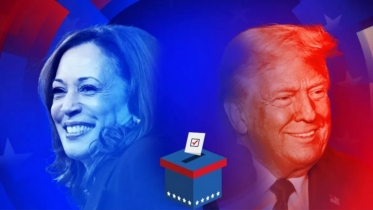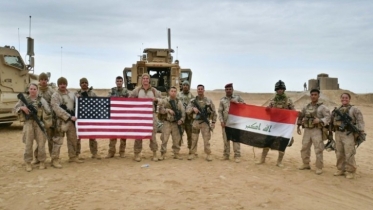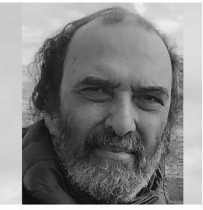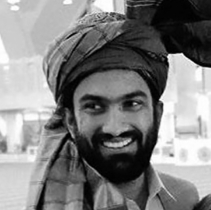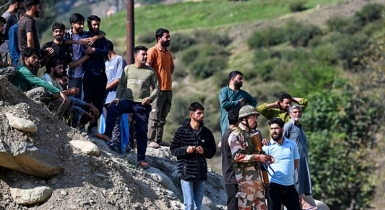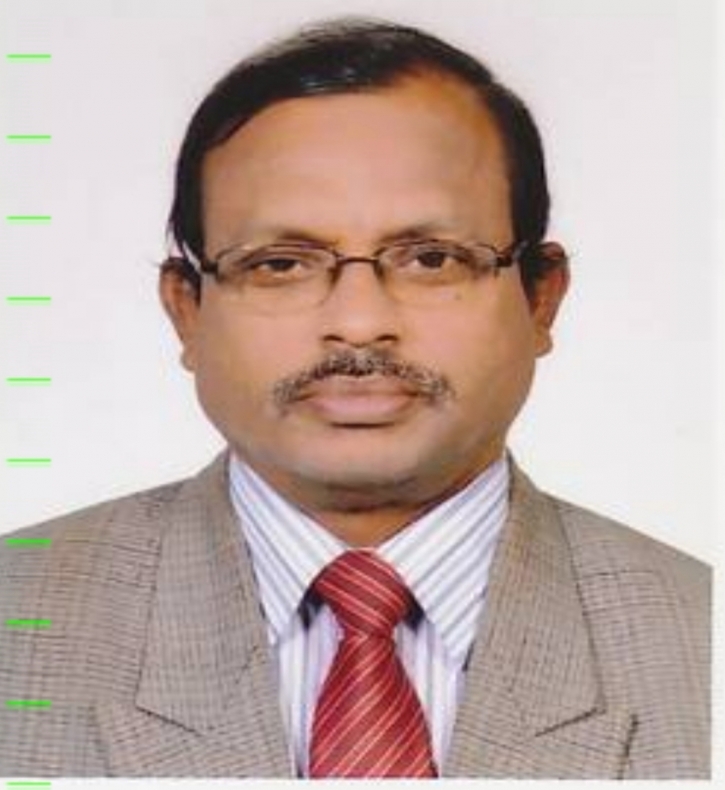
During the general debate on Bangladesh’s budget session 2023-2024 the discussants raised an important issue regarding United States' eye on St. Martin Island of Bangladesh. Why does the United States feel to take the Saint Martin Island? The question is related to the importance of Bangladesh's geopolitical location. At the same time it has become an issue for Bangladesh’s domestic politics. However, as it is now heard, the interest of America about Saint Martin Island has been heard before, but in the current context, its significance is centered around the electoral and power politics on 12th Jatiyo Sangsad election. The question is also important in the context of gradual 'diminishing' or 'declining' trend of USA’s dominant position in the politics over world power. Under the guise of 'diplomatic' etiquette the US Embassy has reiterated its respect for Bangladesh's sovereignty. For the sake of diplomacy, it has to be done!
Mark Beason (2020) of the University of Western Australia shows in a significant study how the international order underpinned by 'American hegemony', is gradually disintegrating since the uncertain and nationalist leadership of Donald Trump, and in the face of growing geopolitical and geoeconomic competition between the US and China. Many commentators fear that such tensions are eroding the influence of the so-called rules-based international system in particular and the values, principles and norms associated with the 'West' in general.
In an interview with The Economist on May 17, 2023, former American Secretary of State Henry Kissinger gave a worrying assessment of the situation of the dominant ‘powers’ of the world. According to him, in the 21st century, ‘old powers are fading, new powers are emerging, and superpower conflict is becoming a threat.’ On May 27, 2023, Kissinger turned 100 years old. There is no living person in the world who is 100 years old and has more experience in international affairs than Kissinger. His basket of experience is incomparably heavy. He has been active first as a scholar of 19th-century diplomacy, later as America's National Security Advisor and Secretary of State, and for the past 46 years as an adviser and emissary to kings, presidents, and prime ministers. When Kissinger talks about being “the old powers,” we understand that he means, among other things, his native country, the United States, and Britain or the United Kingdom and the European Union. For the purposes of the present writing, we take for granted that Kissinger said this about his native country America and the Western world.
On the other hand, the statement of Indian External Affairs Minister S Jaishankar is also plausible in this regard. During his visit to UAE on September 01, 2022, an experienced diplomat and politician, S Jaishankar said that many of the established powers of today's world will undergo a massive demographic change in the next 25 years. "So, if I look at the economy, if I look at the demography, if I look at the technology, I think a lot of these trends really point in a good direction for us," he says.
However, S. Jaishankar goes a step further and does not support the idea that the US is a declining superpower. Jaishankar does not support the notion that the US is a declining superpower. "I am not a votary, frankly, of this declining US [theory]. I would say the evidence points to the US reinventing itself."
Henry Kissinger speaks of the gradual 'diminishing' of the established ‘power(s)’ of world politics. On the other hand, , a veteran diplomat and politician S. Jaishankar, cautiously avoids using the word 'fading', at least in America's case, saying America is 'reinventing' itself.
It is in the light of Jaishankar's experienced observation of the American effort to 'reinvent itself' that the activities of the Americans and the West in Bangladesh must be seen.
This paper attempts to interprete the case of America’s eye on Saint Martins Island on the basis of opinions of Kissinger and Jaishankarelucidiate and the gradual 'fading' of the dominance of the USA vis-à-vis Western world.
If we try to interpret and analyze the statements of Kissinger and Jaishankar side by side, then it is also possible to explain that due to changes in population, economy and technology, there will definitely be changes in world politics. The current superpowers will gradually decline and India, Brazil, South Africa and many other countries will certainly emerge as new superpowers.
Henry Kissinger, the older and more experienced, speaks of the gradual ‘falling away’ of the established powers of world politics. Jaishankar, a veteran diplomat and politician, says that America is "reinventing" itself, at least in America's case..
It is natural to have a mission to capture the island of St. Martin as part of the ‘reinvention’ activity aimed at maintaining the "number one" position of the United States in terms of influence and transition! The USA is well aware of the dynamics of Bangladesh’s internal politics. It is not unknown to the United States of America that a class of influential politicians of Bangladesh is ready to commit murder to serve their own interests.
For example, Khandaker Mushtaq Ahmed was the main conspirator of killing of the elected head of government Bangabandhu Sheikh Mujibur Rahman along with his family members, on August 15, 1975. Mushtaq was a very close companion of Bangabandhu. However, he was the main conspirator, but main beneficiary of Bangabandhu killing was Bangladesh’s first military dictator and founder of BNP Ziaur Rahman. Zia was also one of the main conspirators of August 1975 tragedy. Keeping this in mind, Americans are making various efforts to force Bangladesh to give them Saint Martin Island.
The United States has 750 military bases in 80 countries around the world. At the same time, US allies have military bases in various states. Bangladesh is geographically the gateway to South and South Asia. After all, Bangladesh is located in the heart of the Indo-Pacific Ocean!
This geographical location of Bangladesh is essential to maintain the US dominance or 'number one position' in the Asia-Pacific region, South and South East Asia region, which is very important in the world, if the US base is established in Saint Martin.
For this reason, a political force willing to allow the US to base itself in Bangladesh needs to be in power. People's leader Sheikh Hasina, the blessed daughter of Father of the Nation Bangabandhu, did not agree to it, so they are trying to convince this government by putting pressure on it.
The Bay of Bengal is historically important as an economic highway for commercial shipping routes between the Eastern and Western Hemispheres. About half of the world's container traffic passes through this region. And its ports handle about 33 percent of world trade.
In a regular press briefing, US State Department Deputy Spokesperson Vedanta Patel was asked, Indian Prime Minister Narendra Modi was (then) in Washington DC, USA. US National Security Advisor Jack Sullivan had a meeting with India's National Security Advisor Ajit Doval before his US visit. In that meeting, Ajit Doval said that other countries should not take any initiative in relation to their neighbors, which could negatively impact India's national interest.
A leading Indian daily quoted him as saying that the US should not do anything that disturbs the balance and stability in the Southeast Asian region. For example, during Khaleda Zia's regime in Bangladesh, 10 truckloads of weapons were on their way to be smuggled to the terrorist organization ULFA in Assam, India. This was the main issue with safety. Patel's comments were sought in this regard.
In response, Patel said that he would say two things about this. First, the US will not hesitate to engage and take action in matters and areas of its interest. But he also said that since the issue is related to the region, India is an important partner of the US.
The US works cooperatively with Indian partners to maintain an open Indo-Pacific region.
The US State Department's Principal Deputy Spokesperson further said, 'We jointly address global challenges and deepen our relationship with our Indian partners to continue working towards an open, prosperous, secure, stable and resilient world and the Indo-Pacific region (including Southeast Asia). We want to do it.'
As a bridging nation and a growing middle power, Bangladesh has an opportunity to play a leadership role. And this role is based on Bangabandhu's declared pillar of our foreign policy 'friendship to all and malice to none.'
Based on this principle, with the help of neighboring firend India, it is possible to deal with the conspiracies that are going on for Saint Martin Island ahead of the next 12th National Parliament Election.
It is to be noted that Prime Minister Sheikh Hasina said in a press conference at Ganabhaban last Wednesday (June 21) that ‘I am the daughter of Father of the Nation Bangabandhu Sheikh Mujib. I do not want to come to power by selling the wealth of this country to anyone. (In 2001) I could also stay in power if gas sales were guaranteed. Now if I say I will lease the island of St. Martin to someone, then there is no problem with the power. It won't happen by me. I will not let anyone play with the fate of the people of my country.
*Professor Dr. Arun Kumar Goswami . Director, Center for South Asian Studies, Dhaka; Former Dean, Faculty of Social Sciences, and former Chairman, Department of Political Science, Jagannath University

